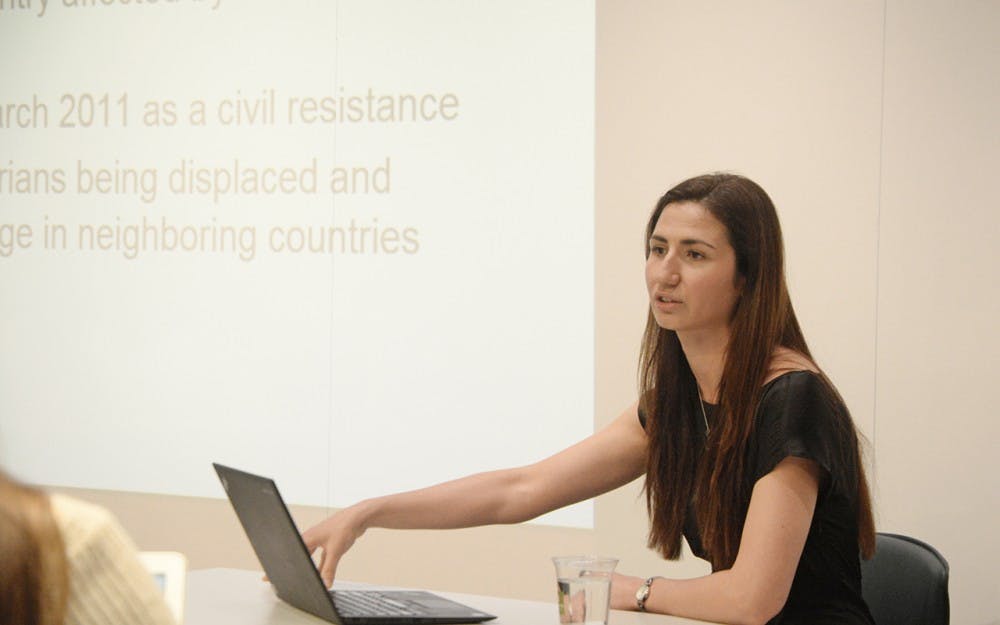While President Donald Trump attempts and fails to ban refugees from America, Turkish President Recep Tayyip Erdogan has not only allowed millions of refugees to enter Turkey but has also created a screening process, which could potentially grant some refugees citizenship.
However, by allowing refugees into the country, the Turkish government faces infrastructure difficulties like educating Syrian children.
IU’s No Lost Generation Student Association, an organization that advocates for Syrian children who are displaced by the Syrian crisis, invited IU graduate student Ozlem Erden to their event “National and International Frameworks Regulating Refugee Education: Challenges and Opportunities of Refugee Education in Turkey,” where she discussed the inconsistency in educating Syrian refugee children in Turkey on Tuesday evening at the Global and International Studies Building.
Erden is a Fulbright Ph.D. scholar at IU’s Center for International Education, Development & Research. Her research concentrates on refugee and immigrant youth.
“Every year they go to a different type of school, which creates an inconsistency,” Erden said. “It’s also affecting finding reliable data to figure out what the problems are.”
The Syrian crisis began March 2011 as a civil resistance, an effect of the Arab Spring, which was a democratic uprising in North Africa and the Middle East.
“When refugees came to the border, they were automatically let in,” she said. “There was no screening process.”
At first Syrian refugees could attend any school they wished, but as the number of refugees increased, the financial burden on the Syrian government increased. This caused the government to allow refugees only in public schools.
The Ministry of Education began offering two types — general education services and alternative educational services.
General education consists of open admission to universities, schools in camps, temporary education centers and Syrian schools. Alternative education offers Turkish language courses, weekend and vocational schools.
Transitioning to a different education system in a different country is often traumatizing for students, Erden said.
“The Turkish government does not do anything to assimilate these refugees,” she said. “When it comes to Syrians, they are reminded that they are Syrians and that they have to protect their identity.”
The younger students are especially prone to becoming traumatized after coming to Turkey because the people around them expect them to be traumatized, Erden said. Often, students are trying to move on from the experience of having a war in their country, but teachers will want them to talk about their feelings to cope.
“As they think all refugee students are traumatized, they are traumatizing the students,” she said.
One aspect of refugee education that is detrimental to Syrian refugee children is the language barrier, Erden said. In Turkish schools, instructors teach children the lessons in Turkish, Turkey’s official language.
When refugees first came over, they were let in, but they were only thought of as guests. The government did not want them to stay, Erden said. However, now that the crisis has lasted so long, the families have to find ways to create a stable lifestyle.
“The first priority of refugees is financial needs,” she said. “Most of the children, particularly boys, end up working in local shops.”
Because of this, many of the children give up or sacrifice their education in some way to work and help support their family, Erden said.
Opening Syrian schools and temporary education centers can be difficult because they struggle to attain resources, she said. There are a small number of available teachers and a lack of books.
“Once refugee students reach a form of satisfaction with the material they have, they begin the second stage of identifying social norms and values that cause difficulties such as misunderstandings with their peers, bullying and social isolation,” Erden said.
The lack of consistency in the Syrian children’s lives makes it difficult for them to feel comfortable within their society, she said. Erden said it is especially difficult when the Turkish locals are too sensitive to the students because the children want to be treated normally.
“They don’t need your pity,” Erden said. “They need your social assistance so they can live a normal life.”






